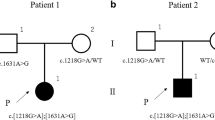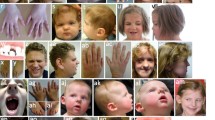Abstract
Bardet-Biedl syndrome (BBS) is an autosomal recessive disorder with locus heterogeneity5,6,7,8,9. None of the ‘responsible’ genes have previously been identified. Some BBS cases (approximately 10%) remain unassigned to the five previously mapped loci10. McKusick-Kaufma syndrome (MKS) includes hydrometrocolpos, postaxial polydactyly and congenital heart disease, and is also inherited in an autosomal recessive manner11,12. We ascertained 34 unrelated probands with classic features of BBS including retinitis pigmentosa (RP), obesity and polydactyly. The probands were from families unsuitable for linkage because of family size. We found MKKS mutations in four typical BBS probands (Table 1). The first is a 13-year-old Hispanic girl with severe RP, PAP, mental retardation and obesity (BMI >40). She was a compound heterozygote for a missense (1042G→A, G52D) and a nonsense (1679T→A, Y264stop) mutation in exon 3. Cloning and sequencing of the separate alleles confirmed that the mutations were present in trans. A second BBS proband (from Newfoundland), born to consanguineous parents, was homozygous for two deletions (1316delC and 1324-1326delGTA) in exon 3, predicting a frameshift. An affected brother was also homozygous for the deletions, whereas an unaffected sibling had two normal copies of MKKS. Both the proband and her affected brother had RP, PAP, mild mental retardation, morbid obesity (BMI >50 and 37, respectively), lobulated kidneys with prominent calyces and diabetes mellitus (diagnosed at ages 33 and 30, respectively). A deceased sister (DNA unavailable) had similar phenotypic features (RP with blindness by age 13, BMI >45, abnormal glucose tolerance test and IQ=64, vaginal atresia and syndactyly of both feet). Both parents and the maternal grandfather were heterozygous for the deletions. Genotyping with markers from the MKKS region12 confirmed homozygosity at 20p12 in both affected individuals.

Similar content being viewed by others
References
Green, J. et al. N. Engl. J. Med. 321, 1002– 1009 (1989).
Beales, P., Elioglu, N., Woolf, A., Parker, D. & Flinter, F. J. Med. Genet. 36, 437– 446 (1999).
David, A. et al. J. Med. Genet. 36, 599– 603 (1999).
Stone, D. et al. Nature Genet. 25, 79– 82 (2000).
Kwitek-Black, A.E. et al. Nature Genet. 5, 392– 396 (1993).
Leppert, M. et al. Nature Genet. 7, 108– 112 (1994).
Sheffield, V.C. et al. Hum. Mol. Genet. 3, 1331– 1335 (1994).
Carmi, R. et al. Hum. Mol. Genet. 4, 9– 13 (1995).
Young, T.L. et al. Am. J. Hum. Genet. 64, 900– 904 (1999).
Bruford, E.A. et al. Genomics 41, 93–99 (1997).
McKusick, V.A., Bauer, R.L., Koop, C.E. & Scott, R.B. JAMA 189, 813–816 (1964).
Stone, D. et al. Hum. Mol. Genet. 7, 475– 481 (1998).
Rosenberg, M.J. et al. Am. J. Hum. Genet. 66, 419– 427 (2000).
McKusick, V.A. Am. J. Hum. Genet. 30, 105–122 (1978).
Acknowledgements
We thank A. McClain, S. Naylor, T. Young and D. Hefferton for patient ascertainment and collection of DNA samples; C. Searby and H. Naik for technical assistance; and R. Swiderski for collection of RNA and assistance with northern-blot analysis. This work was supported in part by NIH grant EY11298 and the Foundation Fighting Blindness (V.C.S. and E.M.S.). V.C.S. is an associate investigator of the Howard Hughes Medical Institute.
Author information
Authors and Affiliations
Corresponding author
Rights and permissions
About this article
Cite this article
Slavotinek, A., Stone, E., Mykytyn, K. et al. Mutations in MKKS cause Bardet-Biedl syndrome. Nat Genet 26, 15–16 (2000). https://doi.org/10.1038/79116
Issue Date:
DOI: https://doi.org/10.1038/79116
- Springer Nature America, Inc.
This article is cited by
-
Nephronophthise und assoziierte Ziliopathien
Medizinische Genetik (2018)
-
Ciliary dysfunction impairs beta-cell insulin secretion and promotes development of type 2 diabetes in rodents
Nature Communications (2014)
-
Current insights into renal ciliopathies: what can genetics teach us?
Pediatric Nephrology (2013)
-
Brain tissue- and region-specific abnormalities on volumetric MRI scans in 21 patients with Bardet-Biedl syndrome (BBS)
BMC Medical Genetics (2011)
-
Mutation analysis in Bardet–Biedl syndrome by DNA pooling and massively parallel resequencing in 105 individuals
Human Genetics (2011)





